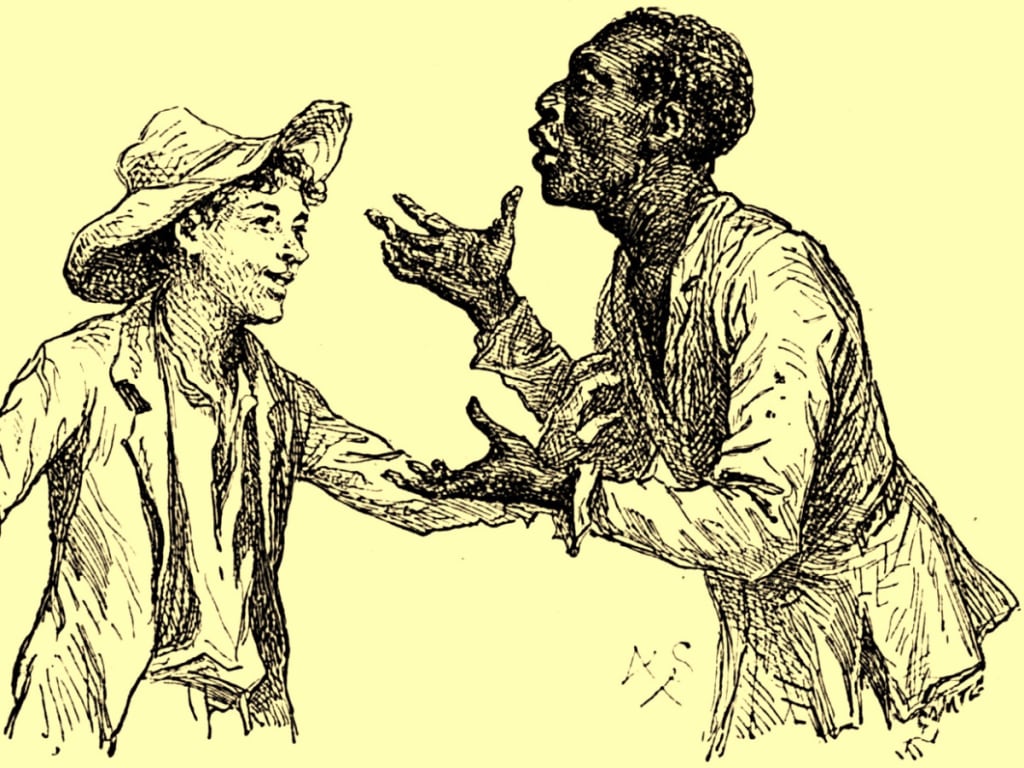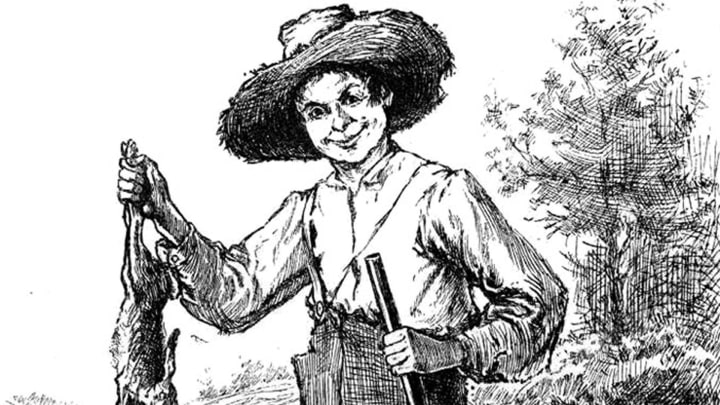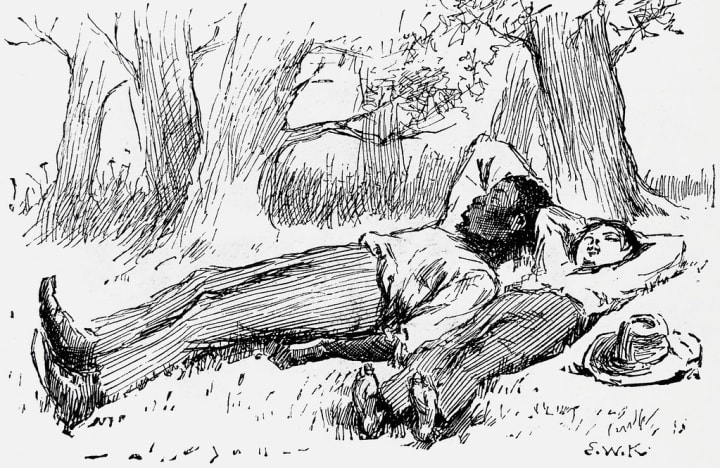"The Adventures of Huckleberry Finn" by Mark Twain
A Reading Experience (Pt.7)

It has been a long, long time since I have first read Huckleberry Finn. When I was a little girl of about seven or eight, there was an illustrated version that was written for very small children, a simplification of the story that I would read. When I was about eleven, I sought out the real thing and pretty much skipped Tom Sawyer because I heard it wasn’t very good. I only read it when I was thirteen and managed to slip my fingertips into Don Quixote. I really don’t remember how that happened at all, I just remember having the book. No idea where i got it from. Huckleberry Finn managed to change my opinions of the possibilities for children’s literature. Apparently, children’s literature could be sophisticated and hyper-realistic even though it was written in a dialect and contained some questionable language uses. It was one of those books that when you first read it, it moves you in its sheer realism, its heartbreaking emotion and the way it takes you away on one of the greatest journeys the Mississippi River has ever seen.
My favourite character of the book was most definitely Huck. Huckleberry Finn is one of the most timeless children’s literary characters and represents so much more than just a rural child experiencing a slowly changing American age. What makes Huck so great is his ability to endure all of these setbacks put on to him. Throughout the book there are many instances that threaten the very existence of Huck’s defiant plan to get himself out of the hell in which he lives and into his own idea of paradise. Some of these setbacks include those to do with Jim and some of them involve Huck’s own father. Some of these setbacks are incredibly dangerous for a young child and Huck figures his way out of them almost every single time. His resilience is extremely high and the way his mind works makes him a very smart boy for his age, though he may not speak in standard English, he has an adventurous quality that makes him very good on the land. Unfortunately for Huck, this is also his fault. As he is a child, Huck is growing up in the pre-Civil War scene of America. The Civil War is not only not very far away but because Huck is so good on the land, it is prophetic that in the coming future of industry, Huck will find it difficult to fit in, lose his place in the world and become dislocated. Working on the land won’t always prove to work in Huck’s favour therefore and he must find his place before it is too late. Huck as a character though, represents far much more than that. Huck also represents the resilience of a child. A child in want of something will do anything within their power to get it. His adventurous nature means that what he wants is to explore the outdoors. In his way of getting it, he carries a man named Jim to freedom in the process. However, when he realises himself out at sea with a man he hardly knows and no real way of turning back home, Huck becomes more and more worried about his future. Even though his childlike nature for adventure is the thing that initially sets him off on his journey, it will also be his realisation of the reality of the dangers in the adventure that will force him to grow up very, very quickly in order to save himself and to save Jim.

A key theme in this book that I have always enjoyed is childhood. There is something good and something pretty dark about the childhoods in this book. The two childhoods of Huckleberry Finn is the first one. I say two childhoods because even though Huck has a taste for adventure and exploration as a child of his time would, his familial lifestyle is tragic, often violent and even brutally abusive. Huck finds not only solace in exploration but the physical sense of getting away from his current childhood encased within his abusive father’s grasp makes his own reality seem nicer and more liberating. Huck plays out the theme of his two childhoods by gaining access to the Mississippi River. it is upon this river that he and Jim will be carried away on their adventure and Huck will no longer have to choose which childhood he requires - whether it is an adventure or some sense of family. This is because Jim becomes almost like his new sense of family and he is still on his adventure. Thus, the two childhoods have collided quite happily and give Huck two things he actually wants. This theme is not only used to support the fact that Huck has both a happy and a depressing childhood, but it is also used to present Huck as one of the last children of his kind. It is his own generation that will feel the biggest impact of the American Civil War and the first industrialisation of the USA and his way of life will finally come to an end. This is like the darkness about Huck’s childhood that overshadows the entire novel. It completely changes how you read the book because in a sense, you feel really bad that eventually for Huck, this time will run out.
This book means so much to me because I first encountered a simplified version when I was very young. It is one of my favourite books in the world because it isn’t pretentious, it isn’t overly studied or analysed, it is just fun, often dark and very deep and meaningful if you are a child who has grown up in an industrial age. My latter reading experiences were deeply changed by Huckleberry Finn because I began looking for more people who experienced the same or similar situations of change in American Literature. I gained access to Thomas Sutpen of “Absalom, Absalom!” by William Faulkner in my teens and I also saw that Anatole Broyard’s “Kafka was the Rage” was a big story of the protagonist’ sheer displacement at the end of the second world war. Through my re-readings of “Huckleberry Finn” though, I have come to realise that this prophetic change that is imminent throughout the book, casting its shadow, is one that Huck himself seems to be aware of in minute detail - persuading his want for adventure in a third aspect. But, as he encounters his journey further and further away from home, he becomes more and more ignorant of the changes around his country. This, I believe, is the best thing about the book. It’s a sort of dramatic irony and it gives the text a whole new meaning.

I think far more people, especially pre-teens, should read “Huckleberry Finn”. I used to teach it and every pre-teen I ever taught it to absolutely loved it. People still widely read this book today honestly because it is a through and through adventure novel to the purest degree. It is a child’s version of Homer’s Odyssey. It is a child’s journey through a progressively changing America that they will come to know nothing about. On my next re-read, I would like to analyse how Huck’s ignorance to this change impacts the way he interacts with certain characters on his journey. It seems interesting that adults adapt to the change faster than the children do and whether that changes Huck in any way at all, whether it makes him more aware or not.
“Right is right, and wrong is wrong, and a body ain’t got no business doing wrong when he ain’t ignorant and knows better.”
"The Adventures of Huckleberry Finn" by Mark Twain
About the Creator
Annie Kapur
200K+ Reads on Vocal.
English Lecturer
🎓Literature & Writing (B.A)
🎓Film & Writing (M.A)
🎓Secondary English Education (PgDipEd) (QTS)
📍Birmingham, UK






Comments
There are no comments for this story
Be the first to respond and start the conversation.